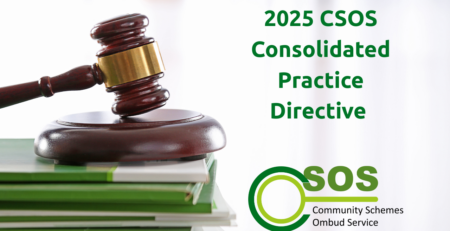The tail cannot wag the dog
Is compliance with Prescribed Management Rules (“PMRs”) 25(1) and (2) of the Sectional Titles Schemes Management Regulations (“STSMA Regulations”), 2016, a pre-requisite for levy debt enforcement?
To answer this question, we need to have a look at the recent High Court interpretations of these provisions and consider the legislative dominance of the Sectional Titles Schemes Management Act[1] (“the STSMA”) over the STSMA Regulations.
According to Honourable Judge Kathree-Setiloane J, who wrote the judgment in the case of the Body Corporate of Central Park v Mosa,[2] to read the STSMA conjunctively with the STSMA Regulations and to construe that a specific regulation could override a general provision, in a statute, is in effect to have the tail wag the dog.[3] When instituting legal action against members who fail to pay levies, special levies and other charges, bodies corporate are often faced with Magistrates who dismiss applications for default judgment due to non-compliance with PMRs 25(1) and (2) of the STSMA Regulations. These delays have placed increased strain on bodies corporate and the success of levy debt collections.
Let’s unpack the provisions contained in PMRs 25(1) and (2) of the STSMA Regulations.
- PMR 25(1) states that the body corporate must, as soon as possible, but no later than 14 days after a general meeting during which the budgets for the administrative and reserve funds for the next financial year were approved,[4] give each member written notice of the contributions and charges due and payable by that member, to the body corporate. The notice must state that the member has an obligation to pay the specified contributions and charges, specify the due date for each payment as well as the interest rate payable on any overdue contributions and charges, if applicable. The notice should further include details of the dispute resolution process which will apply in respect of disputed contributions and charges.[5]
- PMR 25(2) further makes provision for the body corporate to send a final notice to a member, who has not paid the required levies and contributions on the dates specified in the notice referred to in PMR 25(1). The final notice must state that the member has an obligation to pay the overdue contributions and charges and any applicable interest, immediately. If applicable, the final notice must further indicate the interest that is payable in respect of the overdue contributions and charges, as at the date of the final notice, as well as the amount of interest that will accrue daily until payment of the overdue contributions and charges have been made. Finally, the body corporate must state its intentions of taking action to recover the amount due if payment of the overdue contributions, charges and interest owing is not received within 14 days following the date of final notice given.[6]
Guided by recent High Court interpretations into the requirements of PMR 25 (1) and (2), it is important to consider what the primary statutory provisions, contained in the STSMA provide. Focus must be placed on section 3(2) of the STSMA which states the liability for contributions levied, save for special contributions, accrues from the passing of a trustee resolution to that effect, and may be recovered by the body corporate by application to an Ombud from the persons who were owners of the units at the time when such a resolution was passed.[7]
Section 3(3) of the STSMA provides for a special contribution becoming due on the passing of a trustee resolution levying such a contribution and may be recovered by the body corporate by application to an Ombud from the persons who were owners of the units at the time when such a resolution was passed.[8]
Magistrates Courts have often rejected applications for default judgment stating that the STSMA and the STSMA Regulations must be read in conjunction with one another, as they complement each other.[9] This has led to the view that levies, under the STSMA, do not become due and payable from the mere passing of a trustee resolution and may not be recovered until such time as the body corporate has complied with PMR 25(1) of the STSMA Regulations, despite the provisions of section 3(2) and (3) of the STSMA. Therefore, written reasons from magistrates for the dismissal of applications for default judgment often include the interpretation that the liability, to pay levies, arises from the resolution by the trustees and that the liability only becomes due and payable when notice, as set out in PMR 25(1), has been provided to the members of the body corporate.
“It would be absurd to suggest that the body corporate could issue summons for outstanding levies without informing the owners of the amount due and the manner in which the contributions are payable.”[10]
The above quote by the Magistrate, indicates how the Magistrates’ Courts have erroneously been proceeding on the basis that compliance with PMRs 25(1) and (2) is a prerequisite before a body corporate may institute legal action against a member to claim for payment of unpaid levies, special levies and other contributions. This was the specific situation in two principal cases brought on appeal to the Johannesburg High Court from the Randburg Magistrate’s Court, which are discussed below.
In the Body Corporate of Kleber v Obakeng and Another[11] and the Body Corporate of Central Park[12], the appellant bodies corporate lodged appeals to the Johannesburg High Court, following applications of default judgment which were refused by the Magistrate’s Court, due to alleged non-compliance with PMRs 25(1) and (2) of the STSMA Regulations. The appeals were based on the argument that, in terms of s 3(2) of the STSMA, the liability to pay levies accrues the moment a trustee resolution is passed and no further steps need to be taken by the body corporate to cause an indebtedness to arise and make the levies due and payable.[13]
The High Court found, in both matters, that s 3(2) is clear in its meaning in that, upon passing of a trustee resolution, for normal levies, these levies become due and payable each consecutive month thereafter and at the same time as the right to claim accrues to the body corporate.[14]
The High Court held that STSMA does not make provision for notices such as the ones contemplated in PMR 25(1) and (2) of the STSMA Regulations and therefore, failure by a body corporate to provide one or the other of the notices does not negate the body corporates’ rights to claim payment of the arrear levies under ss 3(2) and (3) of the STSMA.[15] In addition thereto, the primary legislation does not prescribe the giving of a notice to make the debt due and payable.[16] A “liability” means, unequivocally, an obligation to perform the prescribed deed, therefore upon the trustee resolution the members have a liability to pay the prescribed levy.[17] Pleading the giving of a notice in terms of PMR 25(1) does not form part of the cause of action.[18]
Furthermore, PMR 25(2) of the STSMA Regulations can be considered an aspect of an administrative procedure to facilitate good practice and is not an injunction that is relevant to framing the cause of action.[19]
The STSMA Regulations are a form of subordinate or delegated legislation made under the authority of the original (empowering) legislation, being the STSMA.[20] Subordinate or delegated legislation can never override any Act of Parliament, or take away any right granted by it.[21] The STSMA Regulations cannot, therefore, be used as an aid to interpret the STSMA, and cannot trump the express primary statutory provisions contained in ss 3(2) and (3) of the STSMA.[22]
Based on the aforementioned reasoning, both appeals were upheld by the High Court and judgments granted in favour of the respective bodies’ corporate.
Therefore, compliance with PMRs 25(1) and (2) of the STSMA Regulations is not currently a pre-requisite for a body corporate to claim unpaid levies from a member, as ss 3(2) and (3) of the STSMA expressly entitle the body corporate to do so on the passing of the trustee resolution in that respect.
There are three other interesting takeaways from these judgments. Firstly, on a proper interpretation of ss 3(2) and (3) of the STSMA, and with specific reference to the word “may”, the trustees of a body corporate can, in the exercise of their discretion, institute court proceedings to enforce payments of levies and contributions and are not compelled to make an application to the Community Schemes Ombud Service (CSOS).[23] Secondly, “reasonable” legal fees were construed to entitle the body corporate to taxed attorney and client costs.[24]
Lastly, due to the nature of appeals from the Magistrates Court to the High Court, which are heard by two judges, these decisions are considered a precedent which is binding on single judges sitting in other divisions, as well as all magistrates, regardless of their jurisdiction. These judgments are a welcoming win for bodies corporate and should reduce both the costs and the time of levy collections in the Magistrates’ Courts.
FOOTNOTES:
[1] Act 8 of 2011.
[2] Body Corporate of Central Park v Mosa (ZAGPJHC) (unreported) case number A3064/2021 of 24 November 2021.
[3] Body Corporate of Central Park para 32.
[4] PMR 7(6)(j)(iv) of the STSMA Regulations.
[5] PMR 25(1) of the STSMA Regulations.
[6] PMR 25(2) of the STSMA Regulations.
[7] Section 3(2) of the STSMA.
[8] Section 3(3) of the STSMA.
[9] Body Corporate of Central Park, para 11 and para 33.
[10] Quote taken from an extract of the learned Magistrate’s written reasons quoted in the written judgment for Body Corporate of Central Park, para 11.
[11] (ZAGPJHC) (unreported) case number A3094/2021 of 9 November 2021.
[12] (ZAGPJHC) (unreported) case number A3064/2021 of 24 November 2021.
[13] Body Corporate of Kleber, para 5.
[14] Body Corporate of Central Park, para 24.
[15] Body Corporate of Central Park, para 27.
[16] Body Corporate of Kleber, para 12.
[17] Body Corporate of Kleber, para 11.
[18] Body Corporate of Kleber, para 12.
[19] Body Corporate of Kleber, para 13.
[20] Body Corporate of Central Park, para 13.
[21] Body Corporate of Central Park, para 14.
[22] Body Corporate of Central Park, para 16.
[23] Body Corporate of Central Park, para 25.
[24] Body Corporate of Central Park, para 38 and PMR 25(4) of the STSMA Regulations.






